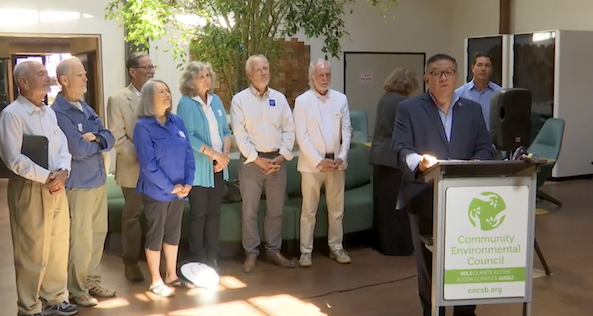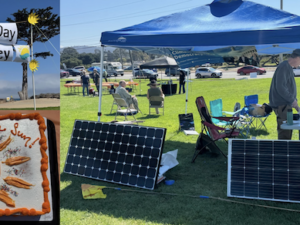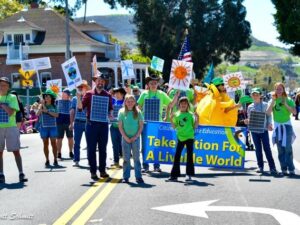FOR IMMEDIATE RELEASE
Carbon pricing bill would supercharge effect of IRA subsidies, cut carbon pollution
SEPT. 25, 2023 – At an event at Santa Barbara’s Community Environmental Council’s Environmental Hub, Rep. Salud Carbajal (D-CA-24) announced today that he will reintroduce the Energy Innovation and Carbon Dividend Act into the House.

Rep. Salud Carbajal and CCL’s Olivia Melonas
The legislation charges corporate polluters a fee for the carbon pollution they put into our air. The money collected goes to Americans in the form of a monthly “carbon cashback” payment to keep things affordable. Speaking at the event, CCL’s Chief Financial Officer Olivia Melonas said, “Polluters can no longer be allowed to use our air as a trash can, freely emitting carbon pollution and warming our world. In fact, polluters should pay.”
This is the first carbon pricing bill put forward in Congress since the passage of last year’s Inflation Reduction Act (IRA), which allocated billions of dollars toward America’s clean energy transition. Even with the emissions cuts projected by the IRA, America is not yet on track to meet its commitment of 50% emissions reductions by 2030.
But a carbon price neatly complements the IRA. Experts from the Rhodium Group point out, “A carbon price can amplify the impact of clean energy incentives.” A policy like the Energy Innovation and Carbon Dividend Act will essentially supercharge the effect of the IRA’s subsidies, encouraging corporate polluters to opt for low-carbon alternatives even faster. Alongside critical reforms to our nation’s energy permitting process, this legislation will ensure America hits its climate targets.
This bill was most recently considered in the 117th Congress, where it gained the support of 95 cosponsors — more than any other carbon pricing legislation in US history.
This policy idea was also under serious discussion in the Senate during the last Congress. In a story headlined “Democrats consider adding carbon tax to budget bill,” the New York Times said, “A tax on carbon pollution could be the most powerful policy enacted by the United States to tackle climate change.” Bloomberg reported, “The White House and at least 49 senators support a proposal to impose an almost $20 per-ton fee on carbon.”
The idea has returned in the current Congress thanks in part to the persistence of grassroots advocates who continue to demand it. Volunteers in Citizens’ Climate Lobby have had 685 meetings with congressional offices so far this year, many of which have focused on the ongoing need for a national carbon fee and dividend policy.
CCL applauds Rep. Carbajal for his leadership in introducing this critical legislation. By putting forth this policy, he is showing what it means to take the climate issue seriously and to meet it with solutions that match the scale of the problem.
Our volunteers will continue to educate their communities and demonstrate to Congress just how popular it would be to make corporate polluters pay. We’ll be gathering supportive constituent comments at tabling events in communities across the country between now and next spring, when we will deliver these messages to district and state offices.
CONTACT: Flannery Winchester, CCL Senior Director of Communications, 615-337-3642,
###
Citizens’ Climate Lobby is a nonprofit, nonpartisan, grassroots advocacy organization focused on national policies to address climate change. Learn more at citizensclimatelobby.org.






